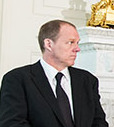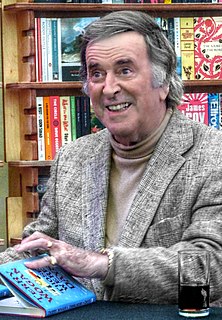A Quote by Brian Helgeland
I'm not like a Sears Catalog of ideas. I don't have that many ideas. I've more or less written them over the years. Usually, I come up with a situation or a character, and it rattles around in my head until the story or the plot emerges.
Related Quotes
Ideas come at any moment -- except when you demand them. Most ideas come while I'm physically active, at the gym, with friends, gardening, so I always carry pen and paper. My first draft is always written in longhand. But once the first dozen chapters, more like short stories, are written, then momentum builds until I can't leave the project until it's done.
Ideas are floating like fish. Desire for an idea is like a bait on a hook. If you desire an idea, it pulls and it makes a kind of a bait. Ideas will come swimming up. And you don't know them until they enter the conscious mind. And then bingo! There it is! You know it instantly. And then more come in. If you go fishing for ideas, a lot of ideas will just pop in. And one of them will make you fall in love.
The ideas always have to be in service of the story. And that's what Scott and the writers did - they weren't trying to beat you over the head with an idea; they had a story they wanted to tell, and they had ideas, so they used the story as a way of fleshing out the ideas. It all depends on where they want to go with it.
One of my standard - and fairly true - responses to the question as to how story ideas come to me is that story ideas only come to me for short stories. With longer fiction, it is a character (or characters) coming to visit, and I am then obliged to collaborate with him/her/it/them in creating the story.
Chris Claremont once said of Alan Moore, "if he could plot, we'd all have to get together and kill him." Which utterly misses the most compelling part of Alan's writing, the way he develops and expresses ideas and character. Plot does not define story. Plot is the framework within which ideas are explored and personalities and relationships are unfolded.
I think that the way that I write stories is by instinct. You have some basic ideas - a character, or an image, or a situation that sounds compelling - and then you just feel your way around until you find the edges of your story. It's like going into a dark room... you stumble around until you find the walls and then inch your way to the light switch.
There are more ideas on earth than intellectuals imagine. And these ideas are more active, stronger, more resistant, more passionate than "politicians" think. We have to be there at the birth of ideas, the bursting outward of their force: not in books expressing them, but in events manifesting this force, in struggles carried on around ideas, for or against them. Ideas do not rule the world. But it is because the world has ideas (and because it constantly produces them) that it is not passively ruled by those who are its leaders or those who would like to teach it, once and for all, what it must think.
Ideas are dangerous, but the man to whom they are least dangerous is the man of ideas. He is acquainted with ideas, and moves among them like a lion-tamer. Ideas are dangerous, but the man to whom they are most dangerous is the man of no ideas. The man of no ideas will find the first idea fly to his head like wine to the head of a teetotaller.
Let's get one thing clear right now, shall we? There is no Idea Dump, no Story Central, no Island of the Buried Bestsellers; good story ideas seem to come quite literally from nowhere, sailing at you right out of the empty sky: two previously unrelated ideas come together and make something new under the sun. Your job isn't to find these ideas but to recognize them when they show up.
I might even go for walks, just kind of come up with ideas in my head and then even sleep over it. And, yeah, the next day, when I wake up in the morning, I feel like that's when the ideas come, because you kind of wake up fresh and clean. You're not influenced from music on the radio or any other source.
Now some people when they sit down to write and nothing special comes, no good ideas, are so frightened that they drink a lot of strong coffee to hurry them up, or smoke packages of cigarettes, or take drugs or get drunk. They do not know that ideas come slowly, and that the more clear, tranquil and unstimulated you are, the slower the ideas come, but the better they are.
If you write, good ideas must come welling up into you so that you have something to write. If good ideas do not come at once, or for a long time, do not be troubled at all. Wait for them. Put down little ideas no matter how insignificant they are. But do not feel, any more, guilty about idleness and solitude.




































